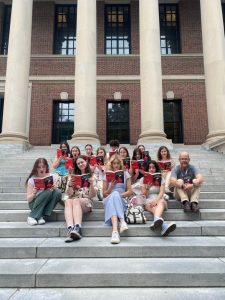No Midterms
January 15, 2021
In year’s past, it has been the norm for HB students to spend a week in January reviewing information from the past semester then spending the next week taking a test on said information. Midterms would count for 10 or 15% of a kid’s grades, making them and finals the most important tests of the year. This year, however, they were canceled. But what led to this?
“The main one was concerns around trying to do, what I would call, a high stakes test… in a remote… or partially remote environment,” said Hollis Brookline High School Principal Rick Barnes. He then continued, “If you’re a remote student, how are you going to access that assessment? What does it look like?” Barnes felt that the school isn’t ready to administer such a test in the current HB environment.
Another concern of Barnes was how much stress this would add to an already stressful year. “Putting on additional pressure to say ‘x project’ or ‘x exam is worth 10% of your grade and sorry it’s a pandemic but try really hard,’ it just doesn’t make a lot of sense to me,” commented Barnes. Students can certainly see where he is coming from.
“Students, they are struggling with normal work right now. Never mind a giant test,” said Ari Frankel ‘21, a senior at HB. Frankel’s mother is also a teacher, though not at HB, which allows them to not just see the student side of everything going on, but a teacher side as well. “From a purely teacher’s perspective, they have to make a giant test [and], somehow… make sure that people don’t cheat,” said Frankel.
Midterms sometimes function as finals, though. When a course only lasts one semester, a class final takes the place of the midterm. Since a decision has not been made on whether or not to cancel finals, teachers who teach semester courses are left in a unique situation. “We need time to figure out what we’re actually going to be able to do and how we want to do it,” commented Social Studies teacher Trevor Duval when asked what he plans to do at the end of the semester.
Typically, Duval would end his Civic’s course, which only lasts a semester, by spending a week and a half preparing for the class final, which counted for about 20% of a kid’s semester grade. Not having exams “actually buys me another week,” said Duval. Due to the change in class schedule at the beginning of the year, every class lost a little bit of time compared to years prior. Without midterms, Duval thinks “We might actually be able to make some of that time up.”
A few questions still remain: what was lost by getting rid of midterms this year, and should this be something that is kept in place for future years? Barnes noted that midterms help teachers see how much students retained over the semester. “Just the knowledge of ‘I did this and this is how well kids were able to retain it,’” may be lost, said Barnes.
Duval, however, had a different take on the situation. With Civics specifically being designed to be a college preparatory class, he looked at how midterms and finals prepare students for college. As always, though, Duval looked at both sides of the argument to keep midterms. “A lot of colleges are starting to do away with final exams. They are going to a project or portfolio based final assessment, but there are still enough places where they do expect you to sit down and take an assessment to show that you understand the general set of knowledge, the general set of skills.”
In the end, time will tell how big of an impact the decision to cancel midterms will have. It could be good, it could be bad, it could be mixed. For now, though, I think it is best to just keep moving forward and continue doing the best that we can, no matter what curveball Covid or the world throws us.













